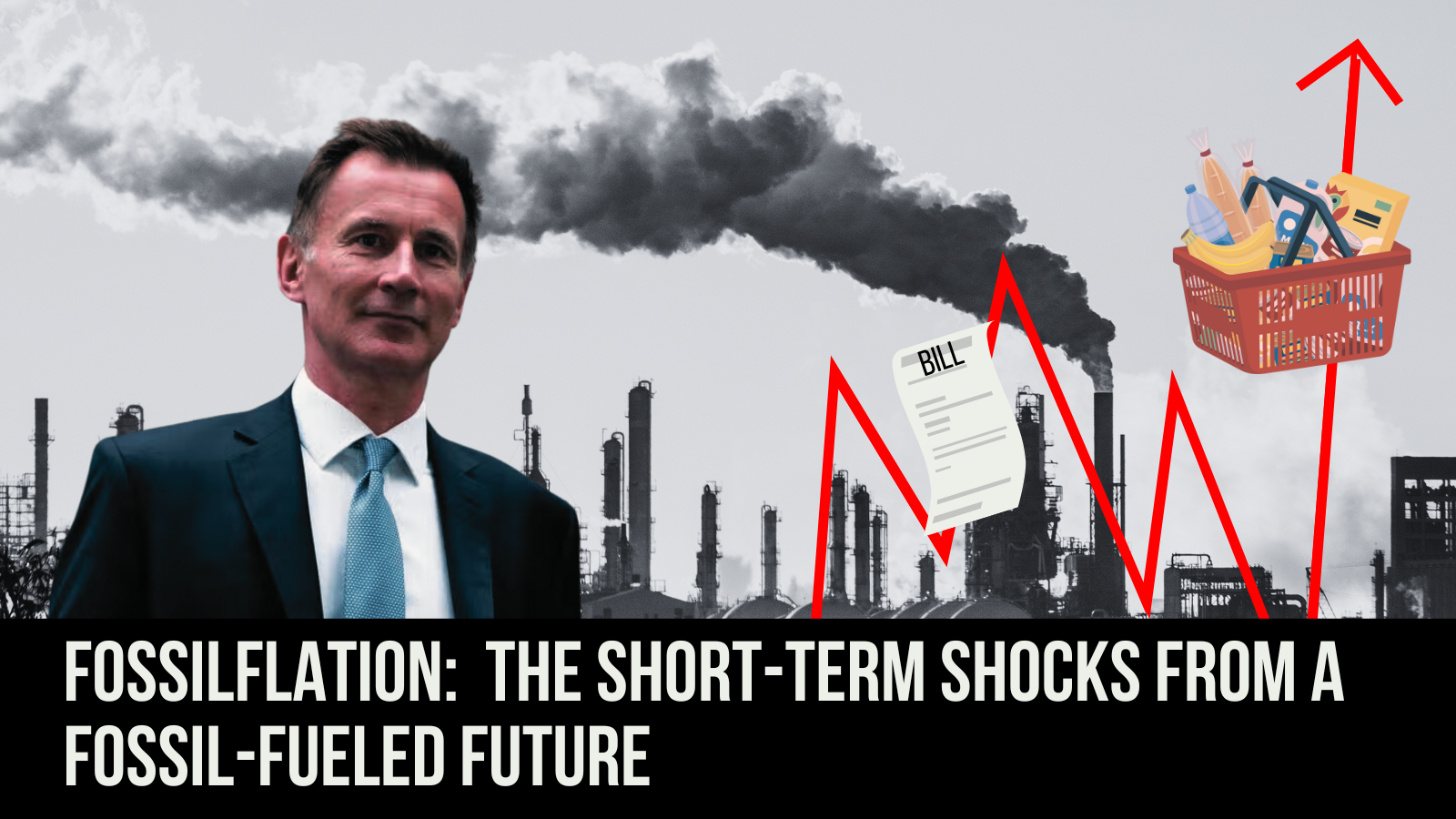
Finance and DemocracyUK
18 December 2025
Nobody needs reminding of the heights that energy bills soared to this past winter, we’ve all felt it.
Nobody needs reminding of the heights that energy bills soared to this past winter, we’ve all felt it. A record number of people reached out to Citizens Advice for crisis support last year, and businesses shut their doors at rates not seen since the last financial crash.
Although the Chancellor ensured that the price cap on energy bills wouldn’t be rising this April by extending the Energy Price Guarantee to June, his failure to extend the Energy Bills Support Scheme means that from April 1st, each household will feel their energy bills increase by at least £67 a month. This is 'fossilflation' in action.

The source of this surge in costs has been widely discussed, and the broad consensus is that a jump in energy demand as the world came out of pandemic-induced lockdowns put a strain on supply which pushed prices up, however it was Russia’s subsequent invasion of Ukraine that really broke the bank, with sanctions against Russia marking an end to our imports of oil and gas from one of the world’s largest producers of both. Fossil fuel companies, banks and traders then worsened the situation by wagering a record amount of bets on the prices of fossil fuels, artificially inflating them further.
Implicit in this story is the idea that these price pressures were unavoidable; a product of a globalised world. That’s certainly where the figures pointed: non-domestic factors accounted for over 70% of UK inflation in 2022. It’s also the line Bank of England governor Andrew Bailey was towing when questioned on the Bank’s response to inflation by the Treasury Select Committee in January last year. He answered ‘a number of these important underlying issues, as many commentators say, monetary policy will not address. I am afraid we cannot bring the gas price down,’ a response which makes the Bank’s decision to continue hiking interest rates all the more baffling.
But what if we looked beyond this surface narrative to the root cause of the current cost of living crisis: a dangerous dependence on fuels whose prices are unpredictable, and uncontrollable domestically due to the international nature of their pricing. We call the effects of this dependence “fossilflation,” because it’s precisely that overreliance on fossil fuels which is stoking inflation.
⚡️NEW: Shell, BP & Jeremy Hunt don’t want you to watch this video.
What’s the ONE word that tells you everything you need to know about your soaring energy bills?
📢Watch, share & take action 👉 https://t.co/8Z2MKBecjD pic.twitter.com/4voGSvHlds
— Positive Money (@PositiveMoneyUK) April 13, 2023
And it’s not just the prospect of war breaking out between one or more fossil-fuel producing countries that causes price shocks. Some instances of fossilflation are entirely environmental: think the bursting of the Nord Stream gas pipeline last year, which caused gas prices to spike by 30%.
Other cases of fossilflation, on the other hand, are not only man made, but made by design. Just this month, the Organisation of Petroleum Exporting Countries (OPEC+) decided to cut oil production so that demand would outpace supply: a move engineered to send prices soaring. It did just that. Overnight, in fact.
The role that profiteering more generally has played in recent inflationary growth is one that central banks are increasingly recognising. The European Central Bank (ECB) recently released research showing that the effect of profits on price pressures in 2022 far outweighed that of labour costs. Even Andrew Bailey, who made headlines last year for urging workers not to ask for pay rises, has changed his tune. Last month, it was businesses Bailey was calling on, urging them not to raise prices because of the impact on inflation.
So what if we took the power out of profiteering hands? While the government claims this can be done by dredging the North Sea for what little oil and gas is left there, this will do nothing to bring our prices down at home. The amounts the UK could produce are too small to affect the global market price, and the fossil fuels in UK waters aren’t owned by the government, but by multinationals, private finance firms and foreign states, who will sell back to us at the market price. Even the former Chancellor Kwasi Kwarteng publicly acknowledged this, and John Glen MP, Chief Secretary to the Treasury, likewise conceded that North Sea exploration won’t guarantee energy security.
To truly reclaim control of the cost of living, we have to make the switch to renewable energy, and retrofit our dated housing stock. The failure of our government to do this already has added £9.8 billion to UK energy bills, and left the UK in the worst economic position in the G7.
But that doesn’t mean it’s too late to change course. Renewables are nine times cheaper than UK gas: this is the real solution to ensuring long-term energy affordability, and frees us from the temperamental clutches of fossilflation once and for all.
The people with the power to make this change happen are accountable to us, the public. That’s why we’re calling on the government and the Bank of England to work together and use their power over both public and private finance to redirect money away from the costly fuels of our past and towards the cheap, limitless energy of our future.
We’re aware that the government won’t call for money to flow away from fossil fuels when it’s actively endorsing new projects, which is why we’re also calling for an end to the approval of new fossil fuel projects.
A government working in the public interest doesn’t allow private companies to prosper whilst workers and families struggle to survive.
Sign our statement to Jeremy Hunt and Andrew Bailey today, so that together we can make fossilflation a problem of the past.
